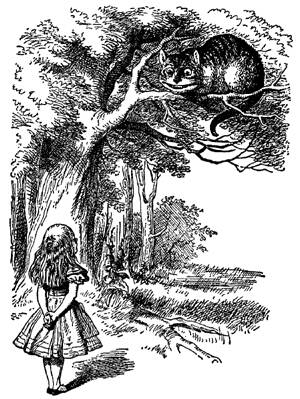Life’s most important lessons are learned in childhood. And, sometimes, from cats. Consider this insight, first gleaned 150 years ago, this year, by a girl named Alice. A Cheshire Cat tutored her in a place called Wonderland.
How we picture life, and our place within it, matters a great deal. When it comes to ourselves, it just won’t do to imagine ourselves as little, isolated spots, especially not if we also see ourselves as the center of the world. We aren’t spots. Indeed, it would be better to think of ourselves as trails, because there’s never in a moment in life, save the first, when we’re not coming from somewhere or on our way to someplace else. That’s what it means to be human: to journey. And, as the Cheshire Cat taught Alice, where you want to go matters greatly, because, if you don’t know, you’ll never get there.
One could say, and one wouldn’t be far from the mark if one did, that the purpose of faith is to plot the future. Religion is all about what we want to be and where we want to go. The person who lacks purpose wanders aimlessly in life. Vital energies are misspent in meandering. At the very beginning of The Inferno, Dante offers a stark image of what it means to stray.
He’s right about that. To be lost, not to know what you want out of life, where you want to go, with whom you want to walk, isn’t only the worst imaginable life. It very accurately describes hell: to wander alone and never to find one’s way.
Creation serves and glorifies God, but we alone are that part of creation that must choose to do so. Creation came about through the will of God. In contrast, the Kingdom of God humbles itself before the human will. We must decide, we must say “yes” to that which God seeks to accomplish. We either go somewhere with a purpose or we meander into muddles that tire and torment us.
The Prophet Amos knew who he was and where he was going, because he knew that he had been summoned. With no little indignation he could reply to Amaziah
Our paths make us humans. They tell us where we’ve come from and who we are becoming in the sight of the Father, who awaits us at trail’s end. To be human is to have a destiny. We are summoned and sent.
The Twelve have names, which we remember. Their identities, their trails matter.
In Baptism we enter the Church. We are called by name, given an identity, and sent on mission to others who must also be called and confirmed. Only companions, those with whom we break bread, can complete the self, can help it to find its way.
In its essentials, the church isn’t a structure or an institution, though each of these is an important part of what it means to be church. Ultimately, to be church is to be companions on the way, a people who know where they want to go and just why it is that they must go together.
Amos 7: 12-15 Ephesian 1: 3-14 Mark 5: 7-13








